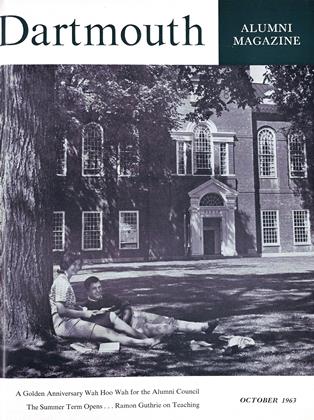By Richard H. Rush '37.Englewood Cliffs, N. J.: Prentice-Hall,1963. 350 pp. $10.00.
At some point in life many people who have acquired wealth have the urge to share it with others. The stimulus to share may be induced by outside pressures. Or, it may come from within the thoughts of the giver for a variety of reasons. More likely, it may be a combination of both sources of pressure.
Sharing the techniques of acquiring wealth, however, is another matter. This is far from typical. Only when an unusual person is involved is it likely to happen. Richard Rush is such a person who has put together a very interesting book.
For those who have a strong desire to speed up the pace of wealth acquisition, the author provides some fascinating illustrations revealing how it may be done. He writes frankly, using firsthand experiences. In so doing he does not pad his batting average of successes so as to make the techniques of application appear too easy. He makes it quite apparent that those who would follow his prescriptions must have, or acquire, certain highly refined personal qualities such as imagination, judgment, perseverance, self-confidence, and adventuresomeness, combined with the ability to master details and evaluate the consequences of alternative courses of action. In short, one must have some, if not all, of the qualities Velben envisaged in the old-time Captains of Industry in the pre-corporate era.
The book is divided into six parts. In Part I, four chapters are devoted to the art of creating capital and income through business operations. In Part II, five chapters are allotted to magnifying capital. Part III consists of three chapters devoted to building capital through corporate connections. Part IV contains seven chapters concerned with such things as investment in a home, in the stock market, in commodities, et cetera, to the betterment of the fortunes of the investor. In Part V, one chapter is devoted to "Oil and Gas" and a second chapter deals with "Growing and Raising." In this latter chapter such things as diverse as race horses, citrus groves, and timber holdings are considered. Finally, Part VI deals with "Odd Time Capital Creation." This enticing title is misleading, however, because in this final section the author tells the reader something more about how to acquire more wealth and income for oneself; how to share it with others while including Uncle Sam in the giving; and some things about the will to acquire and about the current crop of acquirers, who are more often than not "Captains of Finance" rather than "Captains of Industry."
The author, who has been both a "Captain of Industry" and a "Captain of Finance," writes in a rapid-fire, breezy style. It is quite clear that since he left the Hanover Plain and Dartmouth's hallowed halls he has had a busy and exciting life. After all, one who has acquired a doctoral degree in business administration; who has served the Federal government; and who has participated in a great variety of financial and business ventures, cannot by any stretch of the imagination be said to have lived a dull life. One should observe, too, that he has dedicated his book "To Our Country, the United States of America, Where Democracy and Free Enterprise Make Wealth-Building Possible for Every Individual" which reveals his confidence in our "mixed economy." This is refreshing, indeed.
One might be pedantic and take the author to task for over-simplification, for a grammatical slip, or an error in fact, here and there but this writer refrains from using that review, technique. Rather, it is suggested that you read this very readable book and participate vicariously in the activities of a real modern enterpriser. It is far more fun than "Singing Along with Mitch" and, who knows, some readers may be persuaded to emulate Richard Rush in wealth and income creation, expansion, preservation, and sharing. If you do, you will add an ingredient to the economic mix which may stimulate economic growth and add to economic well being.
 View Full Issue
View Full Issue
More From This Issue
-
 Feature
FeatureTHE FIRST FIFTY YEARS
October 1963 By SIDNEY C. HAYWARD '26, -
 Feature
FeatureSome Thoughts About Teaching
October 1963 By RAMON GUTHRIE, A.M. '38 -
 Feature
FeatureArtistry on Film ... ... With Serious Intent
October 1963 -
 Feature
FeatureSUMMER '63
October 1963 -
 Article
ArticleDeaths
October 1963 -
 Article
ArticleWITH THE BIG GREEN TEAMS
October 1963
WILLIAM A. CARTER '20
-
 Books
BooksEARLY AMERICAN LAND COMPANIES
June 1939 By William A. Carter '20 -
 Books
BooksPROCEEDINGS OF THE FIRST ANNUAL NEW HAMPSHIRE BANK MANAGEMENT CONFERENCE. $1.00.
November 1940 By William A. Carter '20 -
 Books
BooksPROCEEDINGS OF THE THIRD NEW HAMPSHIRE BANK MANAGEMENT CONFERENCE
October 1942 By William A. Carter '20 -
 Books
BooksTHE MONETARY AND BANKING SYSTEM
October 1950 By William A. Carter '20 -
 Books
BooksTHE HISTORY OF THE LINSEED OIL INDUSTRY IN THE UNITED STATES.
OCTOBER 1968 By WILLIAM A. CARTER '20 -
 Class Notes
Class NotesPhoenix
December 1975 By WILLIAM A. CARTER '20
Books
-
 Books
BooksALUMNI PUBLICATIONS
May 1921 -
 Books
BooksTHE HISTORY OF THE ORDER OF THE BATH AND ITS INSIGNIA.
MARCH 1973 By CARL BRIDENBAUGH '25 -
 Books
BooksTHE THREAD OF ARIADNE: THE LABRYINTH OF THE CALENDAR OF MINOS.
DECEMBER 1972 By JOHN B. STEARNS '16 -
 Books
BooksEIGHTEENTH CENTURY STUDIES PRESENTED TO ARTHUR M. WILSON.
NOVEMBER 1972 By JOHN HURD '21 -
 Books
BooksAMOS, THE BEAGLE WITH A PLAN.
May 1953 By Margaret W. Minnes -
 Books
BooksAMERICAN PENMANSHIP
JULY 1970 By TRUMAN H. BRACKETT JR. '55
WILLIAM A. CARTER '20
-
 Books
BooksEARLY AMERICAN LAND COMPANIES
June 1939 By William A. Carter '20 -
 Books
BooksPROCEEDINGS OF THE FIRST ANNUAL NEW HAMPSHIRE BANK MANAGEMENT CONFERENCE. $1.00.
November 1940 By William A. Carter '20 -
 Books
BooksPROCEEDINGS OF THE THIRD NEW HAMPSHIRE BANK MANAGEMENT CONFERENCE
October 1942 By William A. Carter '20

